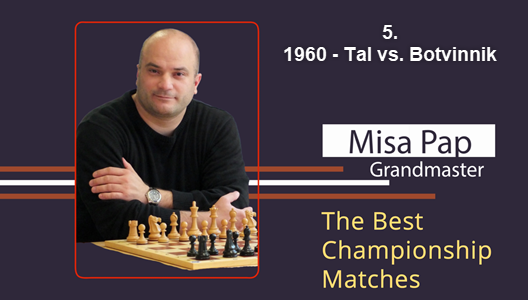Added on 4/1/2021

After Botvinnik won the 1948 tournament for the world title, FIDE introduced a system of cycles for the world championship. Every 3 years, there was a title match; in 1951, Botvinnik faced Bronshtein, one of the best history players who didn't become world champion. The match was tied 12-12, with 5-5 and 14 draws. In 1954, Botvinnik faced another challenger – Smyslov - and managed again to hold his title, 12-12, with 7-7 wins and 10 draws. Matches were played in 24 games. In 1956, a new clause was added: the world champion would have the right to a return match if he had lost. So, when Botvinnik lost to Smyslov in 1957, by 6-3 and 13 draws, he got his chance for a rematch next year and managed to win with 7-5 and 11 draws. The same thing happened with Tal. Michael Tal In 1960, Tal was in his cosmic form, and he was crushing everybody. He also beat Botvinnik with 6-2 and 13 draws. But in the rematch, he lost in 1961 by 10-5 and 6 draws! Smyslov and Tal were champions only for 1 year, and in a period of 15 years (1948-1963), Botvinnik was the champion. He finally lost his title in 1963 to Petrosian (when the return match clause had been removed). Tal became the challenger by first winning the famous Interzonal tournament in 1958, played in Portoroz, Yugoslavia. There also played 15-year-old Robert Fischer, becoming the youngest GM in history (by that point). After the Interzonal, they played the Candidates' tournament in 1959, with 8 players, again in Yugoslavia (Bled, Zagreb, and Belgrade). The first 6 from the Interzonal, and 2 top finishers of the previous Candidates: Keres and Smyslov. The candidates' tournament was convincingly won by Tal, and so he became challenger. In this video, GM Misa shows us what happened in 1960. Mikhail Tal, "the magician from Riga," was in his stellar form, and he managed to win against "iron" Botvinnik, who was very disciplined and was the founder of the Botvinnik school of chess, later Botvinnik–Kasparov school of chess. He was also famous for his very serious preparations for matches, and he also gave younger players guidelines on how to prepare, how to practice, etc. The match was played in Moscow, from March 15th till May 7th.